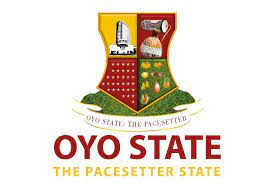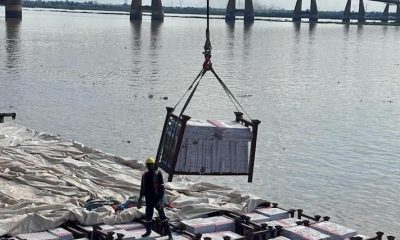Agriculture
NDE Trains 158 Farmers on Agricultural Extension Scheme in Ondo

By Joseph Amah, Abuja
The National Directorate of Employment (NDE) under its agricultural extension scheme has trained no fewer than 158 youth farmers in modern Agricultural practices in Ondo state.
Director General of NDE, Mallam Abubakar Fikpo said this during the flag-off and Orientation of a 5 day Agricultural Extension Training in Akure, the Ondo state capital.
Speaking through the Ondo state Coordinator of the Directorate, Mr Bode
Ogunyankinnu, Fikpo noted that the federal government was committed to lifting more youths out of the unemployment status and as well guarantee food sufficiency.
Fikpo said, “It is important to note that the federal government has not relented in her effort to ensure that jobs opportunities are provided especially for the teeming unemployed youths with the aim of reducing employment and poverty in the country.
“This is being done to improve agricultural extension services in the country which has a high potential for youth employment in the rural communities.”
“Agricultural Extension service also known as Agricultural Advisory Service which uses science and technology driven service plays a crucial role in boosting agricultural productivity, increase food security, improve farming method and also stem down rural- urban migration.
Fikpo noted that the training was for 50 carefully selected interested youths in Agricultural Extension training and another 108 in Sustainable Agric Empowerment Scheme SAES, Graduate Agric Empowerment Scheme GAES, Agric Enhancement Scheme AES, Post Rural Agricultural Development Training Scheme and Community Based Agric Empowerment CBAES.
“Altogether, a total of 158 unemployed youths will undergo training in modern Agricultural practices.
The Director General said that participants will be issued certificate and loan to start their micro Agric related businesses.
He advised them to take advantage of the training to increase their agricultural knowledge and increase their income generating potentials.
Fikpo also charged the participants to be punctual and regular throughout the training period.
Recall that late last year, the directorate recruited and deployed 1,250 persons for training in 24 States and the Federal Capital Territory.
The recruitment and deployment exercise is under the second phase of the training of agricultural extension personnel.
Twelve States had benefitted from a similar training exercise under the pilot phase of the programme.
The 24 beneficiary states under the current phase of the training initiative are Ondo, Akwa Ibom, Anambra, Borno, Bayelsa, Benue and Bauchi. Others are Edo, Ekiti, Enugu, Osun, Gombe Jigawa, Kaduna, Kano and Kebbi states. Also benefiting are Kogi, Lagos, Nasarawa, Plateau, Rivers, Yobe, Zamfara and the FCT.
Agriculture
Nigeria Misses out on $180bn Global Cassava Processing Market

By Torough David , Abuja
With a current production capacity of 62.69 million and holding the position of the largest producer of cassava in the world, Nigeria is missing out of the $180 billion global cassava processing market.
The country’s cassava value chain, although hampered by local consumption, has the potential to drive economic growth and attract foreign investments.
Stakeholders in the value chain say that with improved yield, provision of credits for farmers and accessibility of lands, the country could tap into the $180 billion processed market.
The conversion of fermented cassava into high-quality products—such as High-Quality Cassava Flour (HQCF), cassava starch, bioethanol, and sweeteners (glucose and sorbitol) — could aid in cushioning forex scarcity in Nigeria.
“Nigeria, as the world’s largest cassava producer, generates approximately 18 percent of global cassava output but captures merely 2 percent of the crop’s vast $180 billion global processing market,” said Olayinka David-West, dean of Lagos Business School, Pan-Atlantic University.
David-West reiterated that despite cassava’s substantial production scale—feeding millions daily through staple foods like Garri and fufu and sustaining the livelihoods of approximately 14 million smallholder farmers—over 90 percent of Nigeria’s cassava harvest remains relegated to low-value and food-grade uses.
“This significantly constrains farmer incomes and limits broader economic impact,” she added.
Escalating global demand for industrial cassava products offers Nigeria a significant market opportunity to expand beyond traditional uses, she says.
According to the International Trade Centre, global cassava derivative exports have grown over 20 percent annually in recent years, underscoring robust international demand for industrial cassava products.
Meanwhile, Olayinka Majekodunmi, partner at Boston Consulting Group, emphasised that cassava in its HQCF form serves as a strategic alternative to imported wheat flour, essential for Nigeria’s bakery and snack sectors.
This is imperative as Nigeria imports 98 percent of its wheat needs, amounting to an average of $2 billion annually.
“HQCF presents substantial import substitution potential, potentially unlocking a $600 million market. Currently, utilisation remains low at 5 percent, yet scaling to 20 percent is achievable, given existing facilities are underutilised by approximately 50 percent,” he said.
On the investment opportunities in cassava starch, he explained that it is commonly used in paper, textile and pharmaceutical industries.
“Domestic production significantly lags demand, which grows at approximately 5.2 percent annually, representing a substantial market gap. Capturing this gap could realistically secure an additional $485 million, bolstering local manufacturing capabilities.”
But to conveniently tap into this pool of wealth, stakeholders argue that production must first of all be ramped up.
How production can be bolstered
Although current cassava yields average 6 tons per hectare compared to a global benchmark of 25 tons per hectare. The Food and Agriculture Organisation (FAO) estimates that bridging this yield gap could boost production by an additional 11 million metric tons.
“Key investments are needed in superior, disease-resistant varieties, mechanization, agronomic training, and post-harvest handling improvements to reduce losses,” David-West said.
She said cassava processing costs in Nigeria remain high, often quadrupling in off-grid areas due to unreliable power supply.
Hence, most processing facilities operate 50 percent below capacity, further lowering efficiency.
According to her, this calls for strategic investments in modern processing technologies, renewable energy infrastructure, and agro-industrial clusters.
Echoing her words, Majekodunmi said access to affordable finance remains a major challenge. He urged the development of tailored financial instruments such as patient capital and concessional loans, coupled with securing long-term off-take agreements, which will mitigate risks.
Stakeholders believe that the country has what it takes to drive value addition in the sector, but it requires intentional efforts to bolster yield per hectare and production capacity.
Key industrial derivatives
Among cassava derivatives, four key products present immediate high-growth opportunities, collectively representing a market of approximately $2 billion:
High-Quality Cassava Flour
HQCF serves as a strategic alternative to imported wheat flour, essential for Nigeria’s bakery and snack sectors.
With Nigeria importing roughly 98 percent of its wheat consumption—valued at approximately $2 billion annually—HQCF presents substantial import substitution potential, potentially unlocking a $600 million market.
Currently, utilization remains low at 5 percent, yet scaling to 20 percent is achievable, given existing facilities are underutilized by approximately 50 percent.
Industrial starch: Widely used in sectors such as paper, textiles, pharmaceuticals, adhesives, and food additives, local cassava starch offers significant competitive advantages.
Domestic production significantly lags demand, which grows at approximately 5.2 percent annually, representing a substantial market gap.
Capturing this gap could realistically secure an additional $485 million, bolstering local manufacturing capabilities.
Sweeteners (Glucose and Sorbitol)
Nigeria’s rapidly growing sweetener market (18 percent annual growth) remains predominantly import-dependent (95 percent imported), driving up costs for manufacturers.
Cassava-based sweeteners offer a cost-effective alternative, priced considerably lower than imported sucrose.
Companies such as Coca-Cola have indicated strong interest in sourcing locally, underscoring this segment’s immediate scalability and representing a clear $500 million market opportunity.
Bioethanol
Nigeria imports about 26 percent of its ethanol for beverages, pharmaceuticals, and fuel blending, exposing the economy to price volatility.
Cassava-based bioethanol offers significant economic advantages, costing approximately $0.06 per liter less than imported ethanol.
Given Nigeria’s existing ethanol market valued at $420 million, substantial expansion opportunities exist for investors to scale local production.
Agriculture
Don Pushes for Sustainable Environmental Practices

A lecturer at Ahmadu Bello University (ABU), Zaria, Prof. Wisdom Japhet has called on Nigerians to adopt practices that protect the environment and promote sustainable development.
Japhet made the call on Tuesday in Abuja on the sidelines of a training workshop on environmental standards.
The workshop was organized by the Sustainable Procurement Environmental and Social Standards Enhancement Centre of Excellence (SPESSECE ABU), in collaboration with the World Bank.
Japhet, who also serves as the Director of SPESSECE ABU, emphasised the importance of environmental awareness in developmental planning.
He said the goal of the training was to instill in participants the knowledge and capacity to integrate environmental considerations into development projects.
“The aim is to build capacity in the area of sustainable development.
“Every developmental activity must be sustainable. We are training participants to consider environmental impacts and provide consultancy for projects that may have negative consequences on the environment,” he said.
He added that certification in environmental management was becoming increasingly essential, as global standards now prioritise it.
“It’s very important for Nigerians to be both environmentally and socially aware. When you harm the environment, you harm people by extension,” Japhet stated.
He called on stakeholders in both public and private sectors to participate in the SPESSECE training and become certified.
According to him, the programme also equips participants with tools to anticipate environmental issues in projects, including planning for mitigation strategies.
“Most developmental activities have some environmental impact, and if those are not addressed, they cannot be considered sustainable. We must develop, but not at the expense of the environment,” he said.
On the issue of noise pollution, Japhet noted that everyone had a role to play in protecting the environment.
Also speaking, Dr Soala Martyns-Yellowe, an environmental practitioner, said that the SPESSECE project aimed to improve Nigeria’s capacity to manage environmental, social, and procurement standards.
He said the initiative was crucial as Nigeria strived to meet its development goals.
“The idea is to mainstream environmental and social frameworks into national systems,” he said.
Martyns-Yellowe urged relevant agencies to intensify awareness campaigns about the dangers of noise pollution and enforce existing regulations to mitigate its effects.
| ReplyReply allForwardAdd reaction |
Agriculture
Ondo to Partner FUTA on Wildlife Conservation

The Ondo State Government said it will partner with the Federal University of Technology, Akure (FUTA), on the restoration and development of OSSE River Park to international standards for eco-tourists attraction.
Permanent Secretary, Ministry of Agriculture and Forestry, Segun Odusanya stated this during a meeting with the Department of Forestry and Wood Technology and Department of Ecotourism and Wildlife Management of the institution.
Odusanya, who said that there was a need to partner national and international organisations, explained that the state government welcomed technical and logistic support to enhance the park’s restoration and conservation.
“The OSSE River Park is the state’s only conservation park which provides a habitat for wild animals, but it requires attention due to human activities,” he said.
Also, Mr Olushola Ibosiola, Director of Wildlife Conservation, Parks, and Ecotourism in the ministry, emphasised the importance of wildlife conservation and ecotourism, saying that the park covered 285.79 km²
According to him, the benefits of ecotourism include revenue generation, economic incentives, awareness, and research support.
Ibosiola, however, acknowledged the challenges of ensuring sustainable practices and balancing economic benefits with conservation goals.
Prof. Oluseyi Fabiyi and Prof. Adekunle Ogunjinmi, from the two departments in FUTA, expressed their willingness to collaborate with the government to harness the park’s potential.
The duo said the international bodies were willing to provide support for wildlife conservation and ecotourism development.
They promised to schedule a visit to assess the park’s condition and determine the level of intervention required.
































